| Srl | Item |
| 1 |
ID:
123611
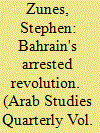

|
|
|
| 2 |
ID:
103239
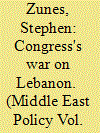

|
|
|
| 3 |
ID:
095605
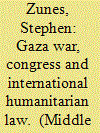

|
|
|
| 4 |
ID:
062175
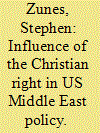

|
|
|
| 5 |
ID:
089816
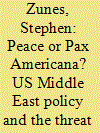

|
|
|
|
|
| Publication |
2009.
|
| Summary/Abstract |
This paper examines US policy in the greater Middle Eastern region in the aftermath of the September 2001 al-Qaida attacks on the United States. The paper argues that the US Administration had engaged in a series of policy initiatives which have posed a direct challenge to the post-World War II international legal order. The doctrine of preventative war, the invasion and occupation of Iraq, threats against Iran, the aggressive counter-insurgency operations and air campaigns in Afghanistan, the backing for some of the more militaristic and expansionist elements in Israel, and related policies have served to alienate the United States from Middle Eastern states and even traditional European and Asian allies whose cooperation is needed in the struggle against international terrorism. The overemphasis on military means to address complex political, social and economic problems in Iraq, Lebanon and Iran has emboldened extremists and weakened moderate voices and have resulted in a more anarchic international order which makes legitimate counter-terrorism efforts all the more difficult.
|
|
|
|
|
|
|
|
|
|
|
|
|
|
|
|
| 6 |
ID:
046302
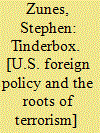

|
|
|
|
|
| Publication |
London, Zed Books, 2003.
|
| Description |
iv, 264p.
|
| Standard Number |
1842772597
|
|
|
|
|
|
|
|
|
|
|
|
Copies: C:1/I:0,R:0,Q:0
Circulation
| Accession# | Call# | Current Location | Status | Policy | Location |
| 046219 | 327.73056/ZUN 046219 | Main | On Shelf | General | |
|
|
|
|
| 7 |
ID:
016749
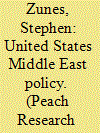

|
|
|
|
|
| Publication |
Aug 1993.
|
| Description |
105-116
|
|
|
|
|
|
|
|
|
|
|
|
|
|
|
|
| 8 |
ID:
142665
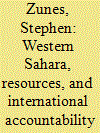

|
|
|
|
|
| Summary/Abstract |
The illegality of facilitating the exploitation of natural resources by an occupying power in non-self-governing territories is well-established in international law, yet – as in such cases as Namibia and East Timor – the legal principles are often overlooked by foreign corporations and their governments. The resource-rich territory of Western Sahara, under Moroccan occupation since 1975, is no exception, as European, North American, and Australian companies have sought to take advantage of lucrative fishing grounds or mineral deposits. While some have tried to claim that such resource extraction is legal since Morocco reinvests the money it receives into the territory through ambitious development programs, the benefits of such ‘development' have largely gone to Moroccan settlers and occupation authorities, not the indigenous population. As with Namibia and East Timor, it may fall to global civil society to pressure such companies, through boycotts and divestment campaigns, to end their illegal exploitation of Western Sahara's natural resources.
|
|
|
|
|
|
|
|
|
|
|
|
|
|
|
|